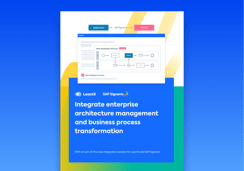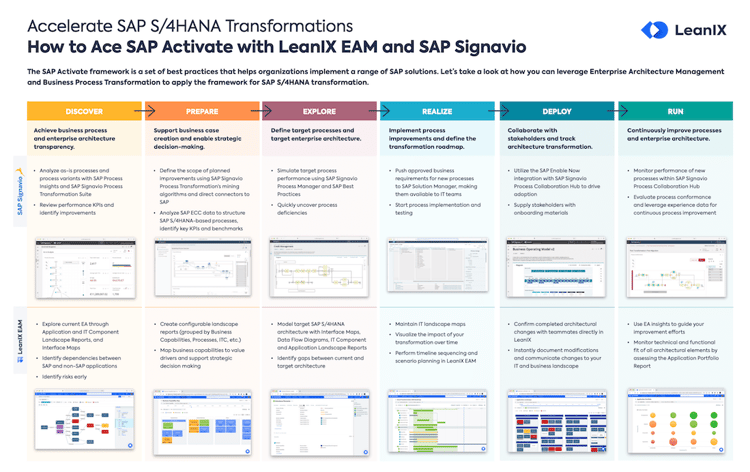SAP Activate methodology phases
Once the appropriate roadmap has been identified, SAP teams and consultants will work through the six phases of the SAP Activate methodology to solve their business pain points. Each of these touchpoints provides a clear step in the process of guiding customers through the SAP implementation lifecycle and identifying the right solution for specific business needs.
1. Discover phase
Purpose
The SAP Discover phase of the SAP Activate methodology is the point where the customer realizes there is a need for a solution. SAP customers will begin to search the SAP landscape for the solution to fulfill the needs of the enterprise. During this phase, customers are able to discover the solution capabilities, understand the business value and determine which roadmap is in alignment with the solution capabilities.
Outcome
The outcome of the Discover phase is to then go ahead with the required SAP solution and move into the next phase of the implementation lifecycle.
LeanIX’s Enterprise Architecture Management for SAP S/4HANA Transformation provides a scalable, shared inventory that streamlines the Discover process. The LeanIX EAM explores the current state of the Enterprise Architecture and identifies key stakeholders, dependencies, and risks. LeanIX also doesn’t limit access based on user licenses so those both inside and outside of company networks can access the platform and participate in architectural reviews.
2. Prepare phase
Purpose
Once the Discover phase is complete, SAP customers can move into the Prepare phase. This phase of the SAP Activate methodology will provide the initial project planning and preparation which ensures that key activities are accounted for in the project timeline.
During this phase, the project is initiated and plans are finalized. It is key that teams are on board and are able to validate the core set of activities, as well as finalize roles and responsibilities and establish strong governance procedures to steer the project towards success. The project team will go through a few iterations to align and confirm project goals.
Outcome
The outcome of the SAP Prepare phase is to prepare consultants for what is arguably the most important phase of the life cycle (the Explore phase) by answering any questions they may have regarding the SAP solution and project. During the Prepare phase, SAP or enterprise architects will build the S/4HANA business case for migration, which outlines the benefits and reasons for migrating from older SAP ERP systems to S/4 HANA.
LeanIX works to facilitate project planning during the Prepare phase by providing on-demand, configurable landscape reports which play a crucial role in mapping business capabilities to value drivers. Landscape reports depict IT landscapes at specific points in time or within a given timeframe. They can be grouped according to various capabilities, processes, and other technical and functional requirements.
3. Explore phase
Purpose
The Explore phase of the SAP Activate methodology lays the foundation for the success of the entire project. During the SAP Explore phase, customers will finalize the business process to be followed in the new SAP system through a series of SAP Fit-to-Standard Analysis sessions where the SAP Best Practice business process flows are showcased to the business process owner.
The purpose of the Explore phase is to establish key deliverables such as standard migration templates and Customer Execution of Standard Processes. All of the customer’s requirements in terms of additional objects (WRICEF - Workflows, Reports, Integrations, Conversions, Enhancements, and Forms), as well as configuration values, are noted in the Backlog document provided by SAP. This will be signed off by stakeholders.
The fit-to-Standard analysis is conducted through a series of workshops that allow for the validation of predefined scenarios. Project teams should be familiar with the SAP Best Practices content available in SAP Best Practices Explorer before launching Fit-to-Standard workshops.
Outcome
A change impact analysis will be completed to understand how the new system will benefit the business. This outcome of the Explore phase is to enable a smooth transition to the new system.
LeanIX’s interface maps and data flow diagrams offer insight to identify gaps and changes which need to be made. They also design new workflow processes for the target architecture. These maps and diagrams support collaboration between both business and IT users as they dissect their ecosystem of applications, interfaces, and data exchange protocols. The integrated connection between LeanIX and Lucidchart allows users to map out business architectures, IT processes and data flows without leaving their primary EA tool.
4. Realize phase
Purpose
The purpose of the SAP Release phase of the methodology is to start configuring the SAP systems according to the Backlog document which should have been signed off during the Explore phase. Project teams will work based on multiple planned sprints which break down the backlog requirements into smaller deliverables. These deliverables will be showcased to the business process owner and signed off once they match the agreed-upon completion criteria.
Outcome
SAP functional consultants and business users will work together to ensure the custom objects are delivered within the timeline and to a high standard. Once all the deliverables are satisfied, a cutover plan is made to move the configurations, SAP WRICEF objects, and master and transactional data to the system which will be used by the business in real-time.
During the building and testing phase of the SAP Activate methodology, customers will need to continuously update maps of the IT landscapes. It’s important to visualize the impact of the changes being made over time. LeanIX provides in-depth functionality, including timeline sequencing and scenario planning, allowing you to dissect fast-changing IT landscapes.
5. Deploy phase
Purpose
The SAP Deploy phase of the SAP Activate methodology is usually done over a weekend or during office downtime, as the new SAP system is deployed for use. The cutover in SAP signals the culmination of months of hard work, but once completed and checked by the partner and customer, business users will continue to be supported if there are any doubts or face any issues.
Outcome
The outcome of the Deploy phase is to implement the new SAP solution so that customers and partners can benefit from the new system while continuing to receive support in case of problems or concerns.
LeanIX supports the Deploy phase by instantly adding confirmed completed architectural changes to architectural documentation.
6. Run phase
Purpose
The final phase of the SAP Activate methodology is the SAP Run phase. This phase signifies the end of the customer’s lifecycle; from identifying the right solution for their business need to finally implementing the solution and running business processes as needed.
Outcome
The only task for consultants during the Run phase is to keep up-to-date with the latest innovation and technologies in SAP as part of the product’s “Continued Learning” philosophy. Once the transformed SAP landscape is up and running, the focus shifts to continuous improvement and risk management.
The LeanIX EAM provides everything you need to monitor the technical and functional fit of SAP solutions and all architectural elements. As business demands and technical needs evolve over time, the insights captured by LeanIX guide ongoing improvement efforts.
Conclusion
The SAP Activate methodology has been designed specifically to aid SAP customers in implementing and upgrading vital business software and has matured into a significant methodology for SAP S/4HANA implementation and other conversion projects. Following this methodology will speed up and improve complex solution implementation projects by providing clear guidelines and roadmaps for success.
Further solutions such as LeanIX EAM can be used to benefit SAP Architects and SAP Project Managers by providing additional insights into their architecture and business processes.
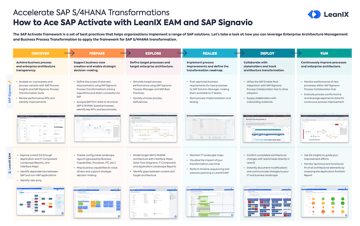
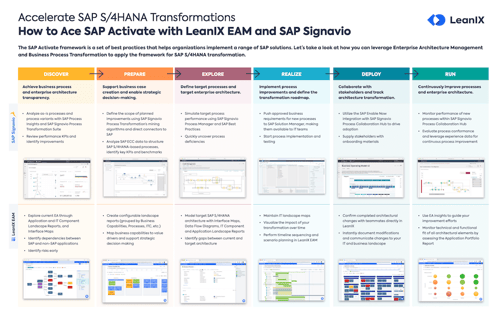

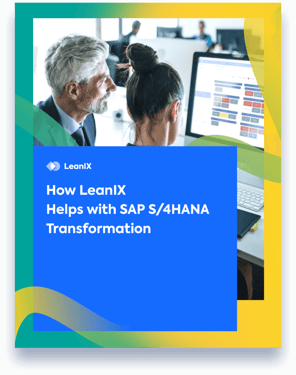
/EN/Reports/EN-LX-SAPS4HANA-Survey-Resource-Page-Thumbnail.png?width=260&height=171&name=EN-LX-SAPS4HANA-Survey-Resource-Page-Thumbnail.png)
/EN/White-Paper/EN-SAP-Getting-it-Right-WP-Page-Thumbnail.png?width=260&height=171&name=EN-SAP-Getting-it-Right-WP-Page-Thumbnail.png)
/EN/Video/Webinar-Thumbnail-360x250@2x-2.png?width=260&height=171&name=Webinar-Thumbnail-360x250@2x-2.png)
/EN-WP-SAP-S4Hana-Migration-Resource_Page_Thumbnail.png?width=260&height=171&name=EN-WP-SAP-S4Hana-Migration-Resource_Page_Thumbnail.png)
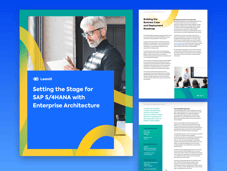
/EN-S4Hana-Challenges-Poster_Resource_Page_Thumbnail.png?width=260&height=171&name=EN-S4Hana-Challenges-Poster_Resource_Page_Thumbnail.png)
/EN/Poster/LeanIX_Poster_6_Ways_to_Ensure_a_Smooth_SAP_S4HANA_Transformation_EN-Resource-Page-Thumbnail.png?width=260&height=171&name=LeanIX_Poster_6_Ways_to_Ensure_a_Smooth_SAP_S4HANA_Transformation_EN-Resource-Page-Thumbnail.png)
